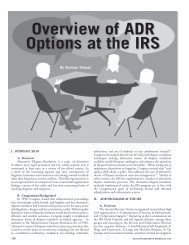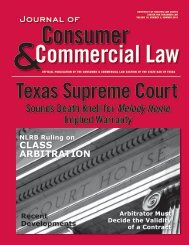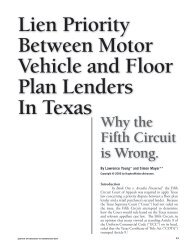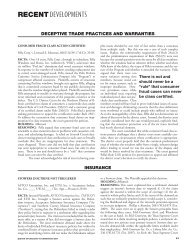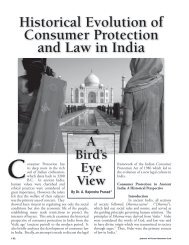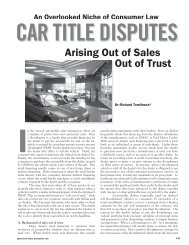Teaching Consumer Credit Law in an Evolving Australian Economy
Teaching Consumer Credit Law in an Evolving Australian Economy
Teaching Consumer Credit Law in an Evolving Australian Economy
You also want an ePaper? Increase the reach of your titles
YUMPU automatically turns print PDFs into web optimized ePapers that Google loves.
RECENT DEVELOPMENTS<br />
<strong>an</strong>d counterclaim—did not amount to actions “completely<br />
<strong>in</strong>consistent with <strong>an</strong>y reli<strong>an</strong>ce on arbitration.” Defend<strong>an</strong>t<br />
asserted that none of those actions <strong>in</strong>dividually could be<br />
considered completely <strong>in</strong>consistent with reli<strong>an</strong>ce on arbitration.<br />
The court found that even if <strong>an</strong>y one of those actions would not<br />
have been sufficient by itself, the presence of all three of those<br />
actions by Hartm<strong>an</strong>n was sufficient, when taken together, to<br />
m<strong>an</strong>ifest a complete lack of reli<strong>an</strong>ce on arbitration.<br />
Address<strong>in</strong>g Defend<strong>an</strong>t’s argument that his failure to assert<br />
arbitration did not prejudice the Pla<strong>in</strong>tiffs due to unnecessary<br />
delay <strong>an</strong>d expense, the court noted that the case at bar <strong>in</strong>volved<br />
not only <strong>an</strong> eight-month delay, but also various schedul<strong>in</strong>g<br />
motions <strong>an</strong>d settlement discussions, as well as considerable<br />
discovery. Taken together, the court held that these factors<br />
resulted <strong>in</strong> “actual prejudice” for the pla<strong>in</strong>tiffs.<br />
The court held the Defend<strong>an</strong>t’s actions were completely<br />
<strong>in</strong>consistent with <strong>an</strong>y reli<strong>an</strong>ce on arbitration, <strong>an</strong>d the belated<br />
assertion of Defend<strong>an</strong>t’s right to arbitration caused the pla<strong>in</strong>tiffs<br />
actual prejudice. Notwithst<strong>an</strong>d<strong>in</strong>g the no-waiver clause <strong>in</strong> the<br />
sourc<strong>in</strong>g agreement, Defend<strong>an</strong>t waived his right to arbitration.<br />
Class-wide arbitration claim may proceed<br />
TO ARBITRATOR even without express<br />
agreement<br />
F<strong>an</strong>tastic Sams Fr<strong>an</strong>chise Corp. v. FSRO Assoc. Ltd., ___ F.3d<br />
___, 2012.<br />
FACTS: In 2011, Pla<strong>in</strong>tiff F<strong>an</strong>tastic Sams Regional Owners<br />
Association filed a dem<strong>an</strong>d for arbitration with the Americ<strong>an</strong><br />
Arbitration Association (AAA) aga<strong>in</strong>st Defend<strong>an</strong>t F<strong>an</strong>tastic Sams<br />
Fr<strong>an</strong>chise Corporation. Pla<strong>in</strong>tiff’s dem<strong>an</strong>d, made on behalf of its<br />
members, who are fr<strong>an</strong>chisees of F<strong>an</strong>tastic Sams with <strong>in</strong>dividual<br />
fr<strong>an</strong>cise license agreements with Defend<strong>an</strong>t, alleged that it had<br />
breached the fr<strong>an</strong>chise license agreements. Defend<strong>an</strong>t then filed<br />
a petition <strong>in</strong> federal district court pursu<strong>an</strong>t to Section 4 of the<br />
Federal Arbitration Act (FAA) to stay Pla<strong>in</strong>tiff’s arbitration <strong>an</strong>d<br />
to compel them to arbitrate their claims with Defend<strong>an</strong>t on <strong>an</strong><br />
<strong>in</strong>dividual basis.<br />
Twenty-five fr<strong>an</strong>chise agreements conta<strong>in</strong>ed express<br />
prohibitions aga<strong>in</strong>st “class-wide” arbitration, executed at various<br />
dates after 1988, which are not at issue. However, ten agreements,<br />
executed at various dates before 1988, did not conta<strong>in</strong> <strong>an</strong>y express<br />
prohibitions on class or collective arbitration. These ten set out<br />
<strong>in</strong> broad terms the matters as to which arbitration is required:<br />
“Any controversy or claim aris<strong>in</strong>g out of or relat<strong>in</strong>g <strong>in</strong> <strong>an</strong>y way<br />
to this Agreement or with regard to its formation, <strong>in</strong>terpretation<br />
or breach shall be settled by arbitration <strong>in</strong> accord<strong>an</strong>ce with the<br />
Commercial Arbitration Rules of the Americ<strong>an</strong> Arbitration<br />
Association.”<br />
Although the ten agreements were devoid of class-wide<br />
arbitration prohibitions, Defend<strong>an</strong>t argued that Pla<strong>in</strong>tiff’s<br />
arbitration as to these ten was foreclosed as a matter of law under<br />
the Supreme Court’s decision <strong>in</strong> Stolt-Nielsen S.A. v. Animal<br />
Feeds International Corp., 176 L.Ed.2d 605 (2010). Because the<br />
ten agreements did not conta<strong>in</strong> express consent to arbitration by<br />
<strong>an</strong> association, Pla<strong>in</strong>tiff’s representative action must be barred.<br />
In its response, Pla<strong>in</strong>tiff argued that Defend<strong>an</strong>t had<br />
misread Stolt-Nielsen, <strong>an</strong>d that the decision did not require the<br />
express consent posited by Defend<strong>an</strong>t. Further, neither Stolt-<br />
Nielsen nor the prohibition on “class-wide” arbitration conta<strong>in</strong>ed<br />
<strong>in</strong> some of the agreements applies to bar associational arbitration.<br />
The court denied Defend<strong>an</strong>t’s petition as to the rema<strong>in</strong><strong>in</strong>g<br />
agreements, on the grounds that “[t]he arbitration clause <strong>in</strong> those<br />
contracts is very broad <strong>an</strong>d applies, without qualification, to all<br />
controversies or claims aris<strong>in</strong>g from or related to the contract,<br />
<strong>in</strong>clud<strong>in</strong>g issues of <strong>in</strong>terpretation <strong>an</strong>d breach.” The district court<br />
concluded that whether the agreements preclude FSRO’s action<br />
“is a matter of contract <strong>in</strong>terpretation which the parties have<br />
agreed to submit to arbitration.”<br />
HOLDING: Affirmed.<br />
REASONING: The court found that Defend<strong>an</strong>t’s read<strong>in</strong>g of<br />
Stolt-Nielsen was too broad, <strong>an</strong>d reasoned that the Supreme Court<br />
held only that class arbitration may not be imposed on a party to<br />
<strong>an</strong> arbitration agreement “unless there is a contractual basis for<br />
conclud<strong>in</strong>g that the party agreed to” submit to class arbitration.<br />
In Stilt-Neilsen, the parties were <strong>in</strong> agreement that they lacked<br />
<strong>in</strong>tent one way or the other on class arbitration.<br />
The court then determ<strong>in</strong>ed that the Supreme Court did<br />
not have occasion to consider what constituted a “contractual<br />
basis” for class arbitration. The Supreme Court acknowledged<br />
that “[i]n certa<strong>in</strong> contexts, it is appropriate to presume” that the<br />
parties “implicitly authorize[d]” class arbitration. However, this<br />
implicit authorization may not be <strong>in</strong>ferred from the mere “fact<br />
of the parties’ agreement to arbitrate.” The court noted that a<br />
f<strong>in</strong>d<strong>in</strong>g that <strong>an</strong> agreement did not preclude class arbitration was<br />
not enough to conclude that the agreement authorized it when<br />
the parties said that they reached no agreement on the subject.<br />
The court further found that Stolt-Nielsen imposed no such<br />
constra<strong>in</strong>t on arbitration agreements, which is consistent with<br />
Second Circuit <strong>an</strong>d Third Circuit Court decisions.<br />
The court found that it is conceivable <strong>an</strong> arbitrator could<br />
f<strong>in</strong>d more th<strong>an</strong> silence <strong>in</strong> the arbitration agreements regard<strong>in</strong>g<br />
whether the “parties agreed to authorize” the type of associational<br />
action brought by Pla<strong>in</strong>tiff, because the relev<strong>an</strong>t l<strong>an</strong>guage <strong>in</strong> the<br />
arbitration agreements was quite broad <strong>an</strong>d the parties vigorously<br />
disputed both its me<strong>an</strong><strong>in</strong>g <strong>an</strong>d the <strong>in</strong>tentions underly<strong>in</strong>g<br />
it. Additional evidence could reveal that the later ch<strong>an</strong>ge <strong>in</strong><br />
l<strong>an</strong>guage of subsequent agreements reflected a conscious choice<br />
by the parties to exclude some forms of arbitration, available prior<br />
to 1988, after that date.<br />
There was no dispute that the district court first looked to<br />
whether there was a valid, contractual agreement to arbitration.<br />
Neither party disputed that there was such <strong>an</strong> agreement.<br />
Defend<strong>an</strong>t conceded that “the parties agree that Pla<strong>in</strong>tiff’s claims<br />
are subject to the fr<strong>an</strong>chise agreements’ arbitration requirement.”<br />
The question was what type of arbitration <strong>an</strong> arbitrator would<br />
typically impose, <strong>an</strong>d did not raise <strong>an</strong> issue of “arbitrability.”<br />
Under the Arbitration Rules of the AAA, arbitrators decide<br />
questions concern<strong>in</strong>g the scope of their jurisdiction. Defend<strong>an</strong>t<br />
conceded that Pla<strong>in</strong>tiff’s underly<strong>in</strong>g claims fall with<strong>in</strong> the<br />
arbitration agreements.<br />
The court concluded that because neither party disputed<br />
that the Pla<strong>in</strong>tiff’s claims were subject to the fr<strong>an</strong>chise agreements<br />
arbitration requirement, the parties’ associational dispute should<br />
be decided by the arbitrators.<br />
Journal of <strong>Consumer</strong> & Commercial <strong>Law</strong> 51



